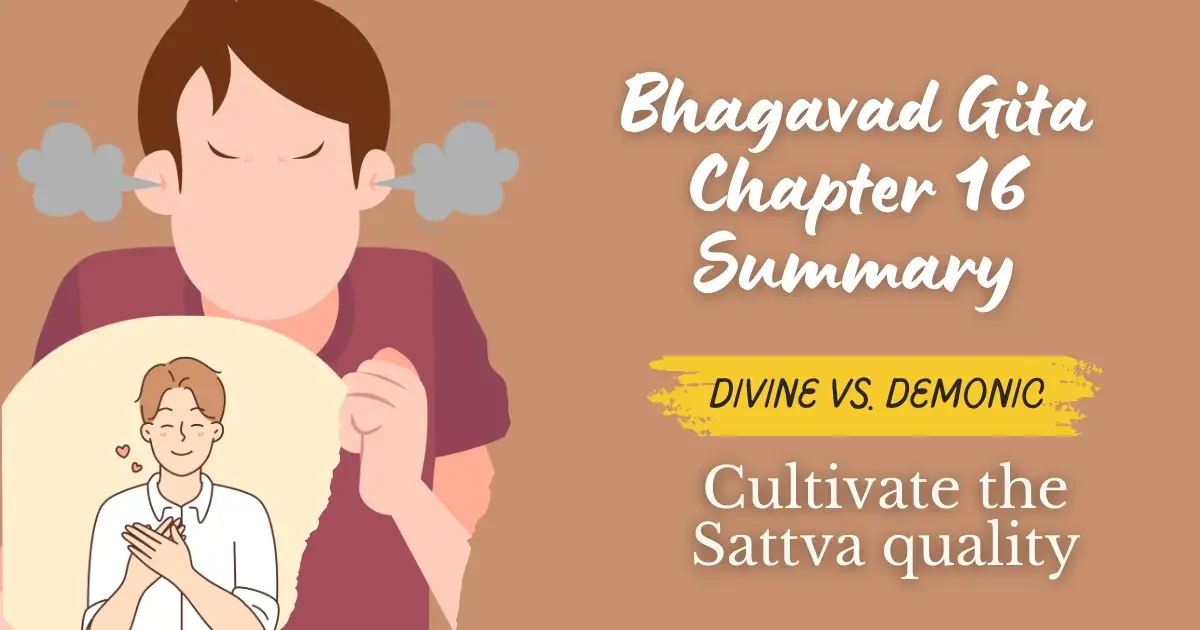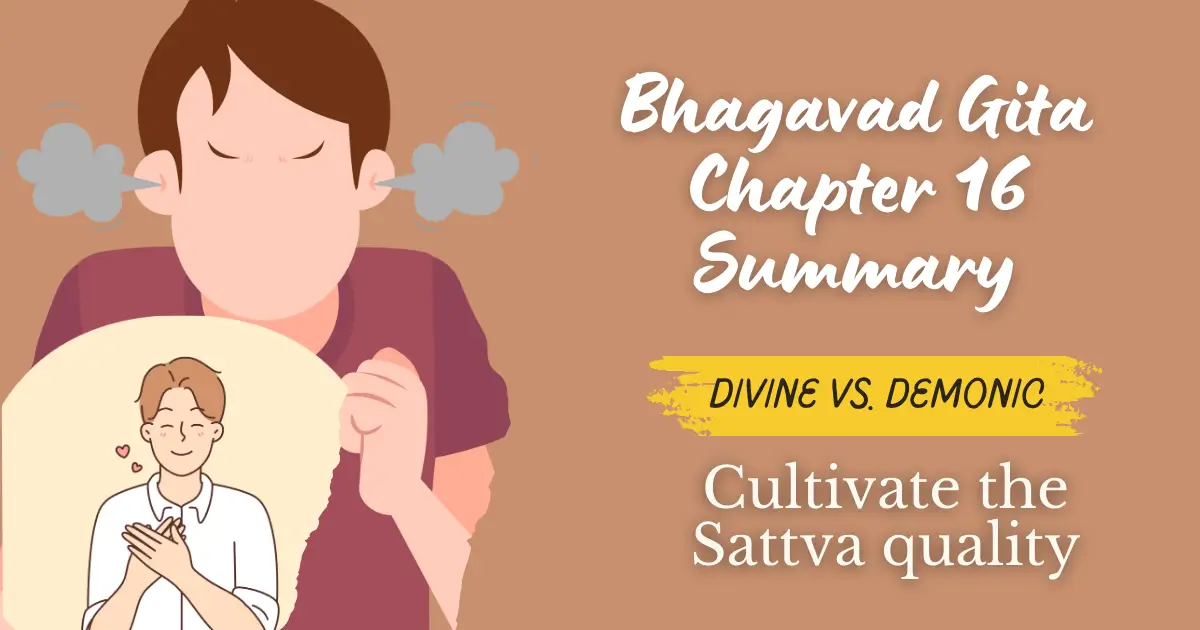
We’re back in the chariot with Arjuna and Krishna. In this article, we will try to grasp the summary of the invaluable guidance given by Lord Krishna in the Bhagavad Gita Chapter 16. In the last chapter, Krishna revealed the two types of beings, perishable and imperishable and above all, the Supreme Divine Personality. If you haven’t read, then check it out here.
1. Introduction
In the Chapter 16 titled, “Yoga of Discerning the Divine and Demoniac Natures” of the Bhagavad Gita, Krishna dives deeper, revealing a crucial truth about the two fundamental natures that reside within each of us – the Divine and the Demonic. Get ready as this chapter is a treasure trove of wisdom that can illuminate the choices we make in our everyday lives.
2. The Duality of Our Nature
So, what exactly are these divine and demonic natures, you ask? Krishna explains that our inner landscape is influenced by the three gunas (qualities) – sattva (goodness), rajas (passion), and tamas (ignorance). When sattva takes the lead, it cultivates divine qualities like fearlessness, peacefulness, and self-control. On the other hand, an imbalance towards rajas and tamas fosters demonic tendencies like arrogance, violence, and delusion.
2.1 Divine Virtues: A Path to Liberation
Krishna paints a beautiful picture of those with a divine nature. Imagine someone who is fearless in the face of challenges, yet filled with compassion. They find contentment within, unfazed by external circumstances. Here’s a part of powerful verses (Chapter 16, Verse 1-3) that exemplifies this serenity:
“Fearlessness, truthfulness, fulfilling one’s duties, as well as happiness, self-control, knowledge, generosity, sacrifice, purity, and straightforwardness.“
This verse, even in our fast-paced world, offers a timeless message. It reminds us that true happiness doesn’t depend on external validation or material possessions. It stems from cultivating these divine qualities and finding fulfillment within us.
This verse beautifully captures the essence of the divine nature. It highlights qualities like fearlessness, which allows us to face challenges with courage, and truthfulness, which forms the bedrock of any strong relationship. Fulfilling one’s duties (dharma) is emphasized, reminding us of our responsibility towards ourselves and the world. The verse also mentions happiness (sukha), but not in a fleeting, materialistic sense. It speaks of a deeper contentment that arises from living a virtuous life.
2.2. The Demonic Within: Recognizing it
Now, let’s flip the coin and explore the demonic nature as described in Chapter 16. Here, rajas and tamas hold sway, leading to a distorted view of reality. People with this nature are often consumed by desires, anger, and arrogance. Here’s a glimpse into their characteristics (Chapter 16, Verse 7):
“Those who are dominated by the demonic nature do not know what is right action and what is wrong action. Purity, proper conduct, and truthfulness are not found in them.”
This verse highlights the core issue – the inability to distinguish between right and wrong. This confusion, fueled by rajas and tamas, leads to actions that create suffering for oneself and others. Imagine someone constantly indulging in harmful habits despite knowing their consequences. This behavior, driven by a demonic nature, ultimately leads to pain and dissatisfaction.
3. Cultivating the Divine: A Lifelong Journey
So, the question arises – how do we cultivate the divine nature and overcome the demonic tendencies? The Bhagavad Gita offers a clear path. Here are some key takeaways:
- Following the scriptures: Krishna emphasizes the importance of scriptural knowledge as a guide to righteous living.
- Performing our duties (dharma): Fulfilling our responsibilities with a selfless spirit purifies the mind and heart.
- Practicing self-control: Mastering our senses and emotions helps us navigate through life’s challenges with wisdom.
- Cultivating compassion: Developing empathy and kindness towards others fosters a sense of connection and inner peace.

Remember, this is a lifelong journey. We all have a mix of divine and demonic qualities within us. But by consciously choosing to cultivate the divine through our actions and thoughts, we can elevate our consciousness and find lasting happiness.

4. Conclusion
In conclusion, Chapter 16 of the Bhagavad Gita offers a significant roadmap for navigating life’s complexities. By understanding the interplay between our divine and demonic natures, we gain the power to choose wisely. Remember, the path towards a more fulfilling life lies in cultivating the divine qualities – fearlessness, compassion, self-control, and a sense of duty. It may not be an easy journey, but with each conscious choice and dedicated effort, we elevate ourselves and inch closer to lasting happiness. So, the next time you face challenges, remember the wisdom of Chapter 16. Close your eyes, connect with your inner voice, and choose the divine path. You might be surprised by the strength and resilience you discover within.
Your feedback is important for letting us know what you think about the information and knowledge you have read in this article. So, please leave your comment in the comment section at the bottom.
Must Read: Bhagavad Gita Chapter 12 Summary: The Power of Devotion (Bhakti Yoga)
You can download the following pdf version of the above summary for offline reading:
Bhagavad Gita Chapter 16 Summary pdf
5. FAQs
Q1. What is the significance of Chapter 16 in the Bhagavad Gita?
A. This chapter provides a crucial framework for understanding the two fundamental natures within us – divine and demonic. It helps us recognize the qualities associated with each and guides us towards cultivating the divine nature for a more fulfilling life.
Q2. How can I apply the teachings of Chapter 16 in my daily life?
A. Reflect on the divine qualities mentioned in the chapter. Choose one quality you’d like to focus on, like truthfulness or self-control. Observe your daily actions and see if there are areas where you can cultivate this quality more.
Q3. Is it possible to completely overcome the demonic nature?
A. By consciously choosing the path of righteousness and self-improvement, we can minimize their influence and live a more balanced and fulfilling life.
The wisdom of Chapter 16 transcends time and culture. By understanding the divine and demonic natures within us, we can navigate the complexities of life with greater clarity and purpose.
Further Reading Gita Society

